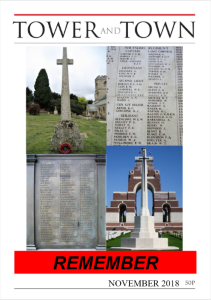

Tower and Town, November 2018 (view the full edition) (view the full edition)WWI: The War To End All Wars?It is not possible to live in an English village - or indeed a Scots, Irish or Welsh one - without being aware of the Grim Reaper's harvest in the years 1914-1918. The war memorials not only enumerate but also name the price of victory, sometimes in whole families of sons. The cost was indeed high - high enough in blood for Britain, but twice as high for France. How could it be otherwise with so many men under arms and for so long? Need it have been so high, however? I maintain that it need not have been. Was it a war of German aggression? Were the Germans truly deserving of the Kriegsschuld (war guilt) verdict of the Versailles peace conference of 1919, the basis of their agreement to pay reparations? There have long been attempts to refute it; in Germany the Nazis exploited the issue during their rise to power. Even some British historians have sought to mitigate the verdict of particular guilt. Yet when the German representative at the Versailles conference asked Georges Clemenceau, the French prime minister, 'What, in your opinion, will future historians make of the troublesome and controversial issue?', Clemenceau replied, 'This I don't know. But I know for certain that they will not say that Belgium invaded Germany!' If for France and Britain, then, the war was not of their making, was the peace they made at Versailles as good as it might have been? When the final treaty was signed, Marshal Ferdinand Foch despaired that it was 'not a peace but a twenty-year armistice'. He would die just ten years later - just ten years before his prophecy was proved true. As Cicero wrote, 'War should be so engaged in that nothing but peace should appear to be aimed at'. For Versailles made a peace that was on the one hand too harsh and on the other too lenient. The Allies' exhaustion after four years' fighting - the cost in blood and treasure - demanded territorial and financial reparations from the Kaiser and his Second Reich. Yet the same exhaustion conceded too much in the arrangements for the future self-government of Germany. And being so exhausted, the Allies would have no will in the years that followed to maintain armies great enough either to enforce the harshness or else to safeguard the leniency. Foch saw it plainly. If all do not agree that the war was not futile, despite its excessive cost, most seem to agree that the peace was truly tragic. And so the debate as to the war's ultimate futility will go on. [The previous article is adapted from Fight to the Finish, based on the author's monthly commentaries in 'The Times', published by Penguin Random House. Allan Mallinson is speaking at St Mary's Church at 7pm on Wednesday 31st October - see full details of Events in Marlborough for Remembrance on page 20. - Editor] Allan Mallinson |